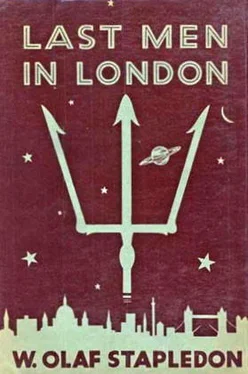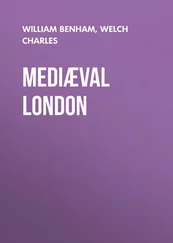I had now to select that mode of the primitive which is distinctive of your own species, a mode characterized by repressed sexuality, excessive self-regard, and an intelligence which is both rudimentary and in bondage to unruly cravings. Now though all the races of your species in all its stages manifest, in spite of their differences, one unique blend of these factors, yet the process of imaginatively assuming this mode of mentality is dangerous; for there is another species, one of our fore-runners on Neptune, which is strangely like you in this respect. I now found myself, as often before, oscillating painfully between these two phases of man’s career. I saw now the hills and tall trees of Earth, now the plains and bushes of Neptune. I assumed now the spidery limbs and jaunty gait of a Terrestrial, now the elephantine legs, kangaroo arms and grave demeanour of an early Neptunian. I listened for a moment to Attic disputation, then suddenly to primitive Neptunian grunts and clicks. It was as though I were listening-in with a radio set of bad selectivity. Or, to change the image, I was a storm-tossed buzzard among the hills, beneath me a dividing range, on either side of it a valley. Into one of these valleys I purposed to descend, but the wind kept thrusting me back over the ridge into the other. At one moment I saw beneath me the desired valley; then, after a vain struggle, the other. At length, however, by a violent effort of attention I succeeded in concentrating upon your species and avoiding the other. Gradually the imagery and thought which flooded in on me came to be entirely derived from the First Men, in one or other of their phases.
But my experience was still chaotic. I had indeed a strong but vague apprehension of your species as a historic whole, of its many long phases of somnolence and its few brief effulgences. And after careful inspection I detected that sense of cosmical tragedy which overwhelmed, or, from your point of view, will overwhelm, the more intelligent of your descendants, when they realize that their species is setting inevitably into decline. But for the most part I had merely a sickening confusion of random samples from all your ages. Thus, at one moment I was an Aurignacian, engraving his cave wall with vivid shapes of deer and bison, while my fellow hunters peered with admiration through the smoke. Now I was a Chinese citizen of that Americanized world-state which lies future to you; and I was speaking in worn and polluted English to my Soudanese wife. Now I was an Elizabethan dame, tight-laced and plastered with jewellery. Suddenly I flashed many thousands of years ahead into that Patagonian civilization which is the last weary effort of your species. I was a prematurely aged boy, prostrate in a temple before the grotesque image of Power. Not until many more of these visions had appeared, and been dismissed, did I find myself approximately in your age. I was an Indian confronting a topeed, bare-kneed Englishman. Rage was in my heart, fear, contempt and subterfuge, and as little understanding of the other as he had of me.
Fatigued but now more hopeful, I forced myself rigorously into the mentality which is common to most members of a primitive industrialistic community. To you this curious mode of experience is so familiar that you do not suspect its rarity and oddity, though many of you feel that it is neither wholesome nor inevitable. That you may realize the violent effort of imagination and emotional control that was now incumbent on me, I will set down the main features which render the primitive industrial mentality so difficult for the explorer. To revert to the image which I have already used, it is as though the buzzard, having successfully descended into the valley of his choice, were now to enter the ventilation shaft of an old disused mine, and were to sink downwards in the dark through fetid air, with scarcely room to keep his wings outspread. No wonder that he suffers considerable distress and incurs serious dangers, before he finally alights amongst the pale and eyeless fauna of the pit. No wonder that his own eyes take time to accustom themselves to the dim phosphorescence which is the sole illumination of that world. When the explorer seeks to establish himself in your society, he has first to assume that jarred and restless mood which is common to all those whose habitual environment is alien to their native capacities. In particular he must imaginatively produce in himself the lifelong strain of perceiving streets, traffic, and stuffy interiors, instead of the landscapes which originally moulded his capacities. He must also reconstruct in himself the unconscious obsession with matter, or rather with the control of matter by machinery and chemical manipulation. He must conceive also the mind’s unwitting obeisance and self-distrust before its robot offspring. Further, he must subject his own free-roaming spirit to the hideous effects of a narrow specialism, both of body and mind. He must conceive the almost inconceivable ignorance and groping hate of the being whose life is moulded to one narrow round of duties and perceptions. Equally he must conceive the profound unwitting guiltiness of the primitive industrial master, and also of that idle scum that floats on the surface of all primitive industrial societies.
Little by little I reproduced in myself this cramped and ungenerous mode of the mind; and, as I did so, visions of your world came crowding in upon me with increasing vividness. I became a half-naked woman in a coal-mine of your Industrial Revolution. I crept on hands and knees along a low gallery. Tugging at the collar like a beast, I dragged a truck. The trace passed between my legs. I was whimpering, not from any present discomfort, but because I had lost a keepsake. This incident was obviously a century or more too early, but others followed, and more and more of them were of your period. I had now to seek out a particular individual among you, and a particular moment of his life. But in doing so, I nearly suffered catastrophe. On Venus there was once, or rather from your point of view there will be, an industrial phase much like your own in certain respects, although the species which produced it was very different from yours. Into that epoch I was suddenly flung by I know not what detail of identity. A face which was obviously not of the First Men, a pale and blinking frog-like face, with a running sore beneath the left eye and a fantastic hat cocked backwards, slowly grimaced at me. For one anxious moment I feared that I should be trapped in that Venerian phase of man, with my mind still moulded to the mentality of the First Men. But by a desperate effort of concentration upon the Terrestrial mode of experience I managed to disengage myself from this dangerous irrelevance. And with one leap I found myself back again at the desired point of your history.
6. IN THE STREETS OF LONDON
I was in a town. A great red vehicle, roaring and trumpeting, was in the act of swooping upon me. Leaping out of its track, I ran to the pavement where two contrary streams of pedestrians brushed past one another. As the archaic chariot left me, I saw on its flank the English word ‘General’, in letters of gold. I had already become familiar with this device on my previous visit to your world, and I now knew that I must be in London somewhere between the invention of the motor-omnibus and the socialization of all such vehicles under a metropolitan authority. The clothes of the women pedestrians were of the style worn in 1914. Skirts left the ankle exposed, waists were confined within broad belts of ribbon, hats were large, and poised high on the crown. Clearly I had struck the right period, but who was I, or rather who was my host? I noted with satisfaction that his basic mental pattern fitted very precisely the mood which I had already myself assumed to take me to my chosen object of study. Surely this must be the young man whom I sought. I shall not reveal his name, since with its aid he or his relatives might recognize the portrait, or the setting, which I must give in some detail. I shall therefore refer to him simply as Paul. I had already observed him on an earlier visit, but now I proposed to follow him through the most critical moment of the career of his species.
Читать дальше












